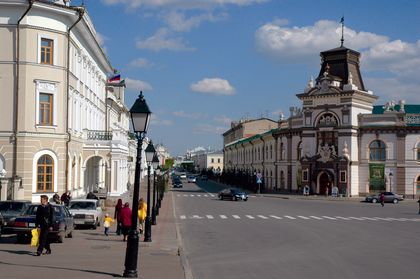“We are expecting maximum investments on Switzerland’s part. There simply can’t be enough,” said Hafiz Salikhov, Tatarstan’s Trade and Economic Cooperation Minister, at the Zurich’s Swiss Invest Forum in June 2006. He drew a capacity crowd in presenting the economic opportunities of this region at the centre of Russia.
The businessmen who came to listen left with sparkling eyes and minds brimming with ideas. And with just cause: boasting a gross regional product that has doubled in the last six years to reach 18.2 billion dollars in 2005, Tatarstan counts among the most dynamic regions of Russia. And it intends to improve on that performance.
“We plan to double our gross regional product by 2010,” said Hafiz Salikhov.
The goal is ambitious but seems realistic. Richly endowed with natural resources (oil, natural gas, gypsum), strong, and well-developed industries (particularly in mechanics) and a favourable geography on the shores of the Volga, Tatarstan has no lack of assets. The Kremlin has even allowed for the creation of a special economic zone for industrial production there, in the Yelabuga district “Our idea for the zone is to place the companies producing automotive components and high-tech petrochemical products there, considering the fact that large automotive companies are located within 400 km of the zone, and the Republic produces a wide range of petrochemical products,” says the Minister.
The zone is also favourable to mechanics, electronics and forestry industries. With its fiscal privileges and its business regulations fixed for at least 20 years, this special economic zone clearly presents clear advantages to foreign investment, which has often been leery of Russia’s unstable fiscal policies.
Sixteen organizations, including Swiss investors, are currently active in Tatarstan. The next wave will be welcome with open arms in this region keen on development and accustomed to a mix of nationalities and cultures by its eventful history. Advantageously situated at the confluence of the Volga and Kama rivers, the region has drawn the interest of many ethnic groups. It was first peopled by the Bulgarians of the Volga, then by the Golden Hoard who arrived with the Tatar-Mongolian invasions of the 13th century.
In fact, Tatarstan gets its name from the Tatar ethnicity.
When the Golden Horde waned, the Tatars founded the Khanat of Kazan, before being once and for all subjugated by Tsar Ivan the Terrible in 1552. Today, Tatarstan is an autonomous republic within the Russian Federation, and as such depends on the Kremlin.
The capital, Kazan, one of the country’s most important university towns (which saw the likes of Vladimir Ilitch Lenin study there), celebrated its 1000th birthday in 2005. Its old city is a UNESCO World Heritage site, in part thanks to its kremlin, which remains one of Russia’s most stupendous sites, and one of its most intriguing in that a mosque sits next to the domed churches that typically compose these fortified places.
Traditionally Muslim, the Tatars represent 53 per cent of the Republic’s population at present, the rest being mainly composed of ethnic Russians (according to a 2002 census). Tatarstan is therefore home to one of Russia’s most populous Muslim communities, a religious community that gets on rather well with its Orthodox counterpart.
Everyone can speak Russian, but Tatar is also an official language.
Tatarstan is slightly bigger than Switzerland (68,000 km2), with four million inhabitants.













